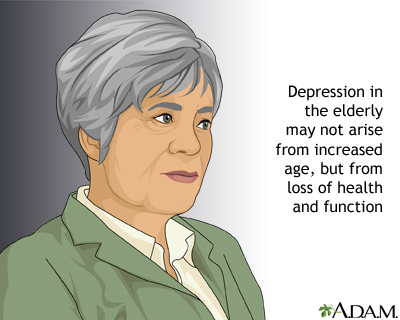Depression - older adults
Depression in the elderly
Depression is a mental health condition. It is a mood disorder in which feelings of sadness, loss, anger, or frustration are present nearly every day for at least 2 weeks. They often interfere with daily life.
Depression in older adults is a widespread problem, and it is not a normal part of aging. It is often not recognized or treated.

The elderly are at high risk for depression because they are more likely than younger people to have experienced illness, death of loved ones, impaired function and loss of independence. The cumulative effect of negative life experiences may be overwhelming to an older person.
Causes
In older adults, life changes can increase the risk for depression or make existing depression worse. Some of these changes are:
- A move from home, such as to a retirement facility
- Chronic illness or pain
- Children moving away
- Spouse or close friends passing away
- Loss of independence (for example, problems getting around or caring for oneself, or loss of driving privileges)
Depression can also be related to a physical illness, such as:
- Thyroid disorders
- Parkinson disease
- Heart disease
- Cancer
- Stroke
- Dementia (such as Alzheimer disease)
Overuse of alcohol or certain medicines (such as sleep aids) can make depression worse.
Symptoms
Many of the usual symptoms of depression may be seen. However, depression in older adults may be hard to detect. Common symptoms such as fatigue, appetite loss, and trouble sleeping can be part of the aging process or a physical illness. As a result, symptoms of early depression may be ignored, or confused with other conditions that are common in older adults. In severe cases, the symptoms may resemble dementia.
Exams and Tests
Your health care provider will perform a physical exam. Questions will be asked about your medical history and symptoms.
Blood and urine tests may be done to look for a physical illness.
A mental health specialist may be needed to help with diagnosis and treatment.
Treatment
The first steps of treatment are to:
- Treat any illness that may be causing the symptoms.
- Stop taking any medicines that may be making symptoms worse.
- Avoid alcohol and sleep aids.
If these steps do not help, medicines to treat depression and talk therapy often help.
Providers often prescribe lower doses of antidepressants to older people, and increase the dose more slowly than in younger adults.
To better manage depression at home:
- Exercise regularly, if your provider says it is OK.
- Surround yourself with caring, positive people and do fun activities.
- Learn good sleep habits.
- Learn to watch for the early signs of depression, and know how to react if these occur.
- Drink less alcohol and do not use illegal drugs.
- Talk about your feelings with someone you trust.
- Take medicines correctly and discuss any side effects with your provider.
Outlook (Prognosis)
Depression often responds to treatment. The outcome is usually better for people who have access to social services, family, and friends who can help them stay active and engaged.
The most worrisome complication of depression is suicide. Men make up most suicides among older adults. Divorced or widowed men are at the highest risk.
Families should pay close attention to older relatives who are depressed and who live alone.
When to Contact a Medical Professional
Contact your provider if you keep feeling sad, worthless, or hopeless, or if you cry often. Also call if you're having trouble coping with stresses in your life and want to be referred for talk therapy.
If you are caring for an aging family member and think they may have depression, contact their provider.
If you or someone you know is thinking about suicide, call or text 988 or chat
You can also call 911 or the local emergency number or go to the hospital emergency room. DO NOT delay.
If someone you know has attempted suicide, call 911 or the local emergency number right away. DO NOT leave the person alone, even after you have called for help.
References
American Psychiatric Association website. Persistent depressive disorder. Diagnostic and Statistical Manual of Mental Disorders, Fifth Edition, Text Revision (DSM-5-TR). Washington, DC: American Psychiatric Association Publishing; 2022.
Fava M, Mischoulon D, Cassano P, Papakostas GI, Stem TA. Depressive disorders. In: Stern TA, Wilens TE, Fava M, eds. Massachusetts General Hospital Comprehensive Clinical Psychiatry. 3rd ed. Philadelphia, PA: Elsevier; 2025:chap 28.
Fox C, Hameed Y, Maidment I, Laidlaw K, Hilton A, Kishita N. Mental illness in older adults. In: Fillit HM, Rockwood K, Young J, eds. Brocklehurst's Textbook of Geriatric Medicine and Gerontology. 8th ed. Philadelphia, PA: Elsevier; 2017:chap 56.
National Institute on Aging website. Depression and older adults.
US Preventive Services Task Force, Barry MJ, Nicholson WK, et al. Screening for depression and suicide risk in adults: US Preventive Services Task Force Recommendation Statement. JAMA. 2023;329(23):2057-2067. PMID: 26813211
Version Info
Last reviewed on: 7/17/2024
Reviewed by: Fred K. Berger, MD, addiction and forensic psychiatrist, Scripps Memorial Hospital, La Jolla, CA. Also reviewed by David C. Dugdale, MD, Medical Director, Brenda Conaway, Editorial Director, and the A.D.A.M. Editorial team.
